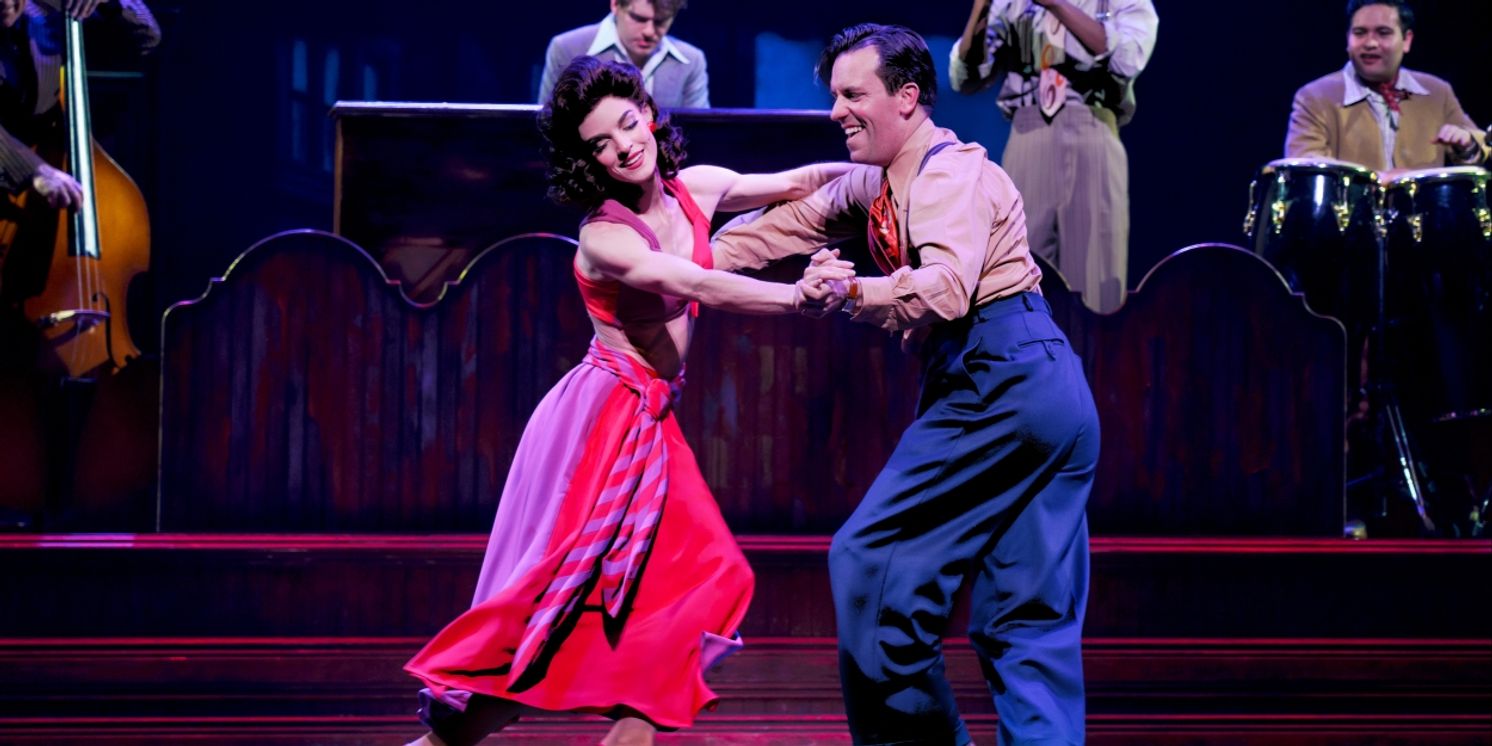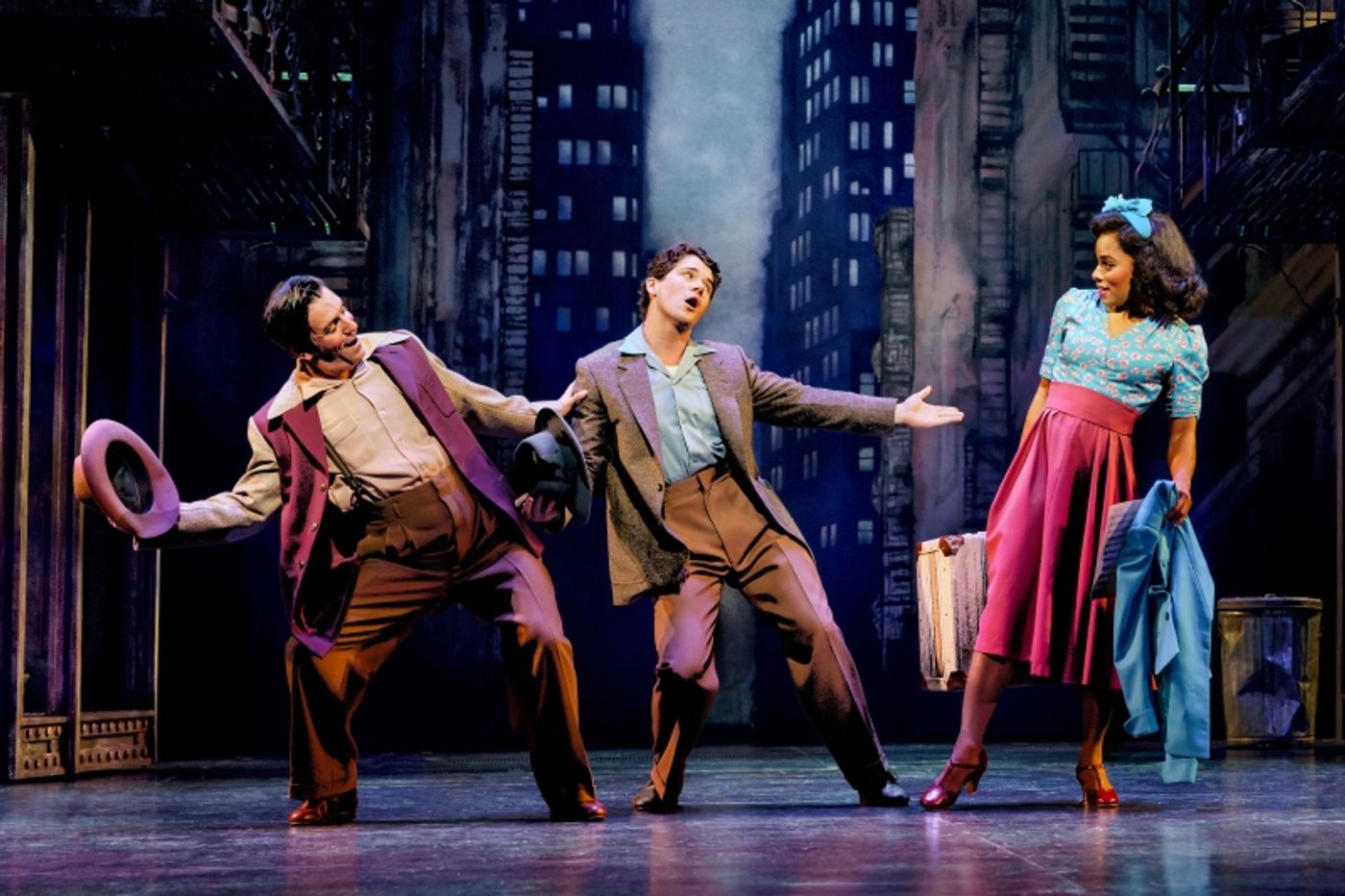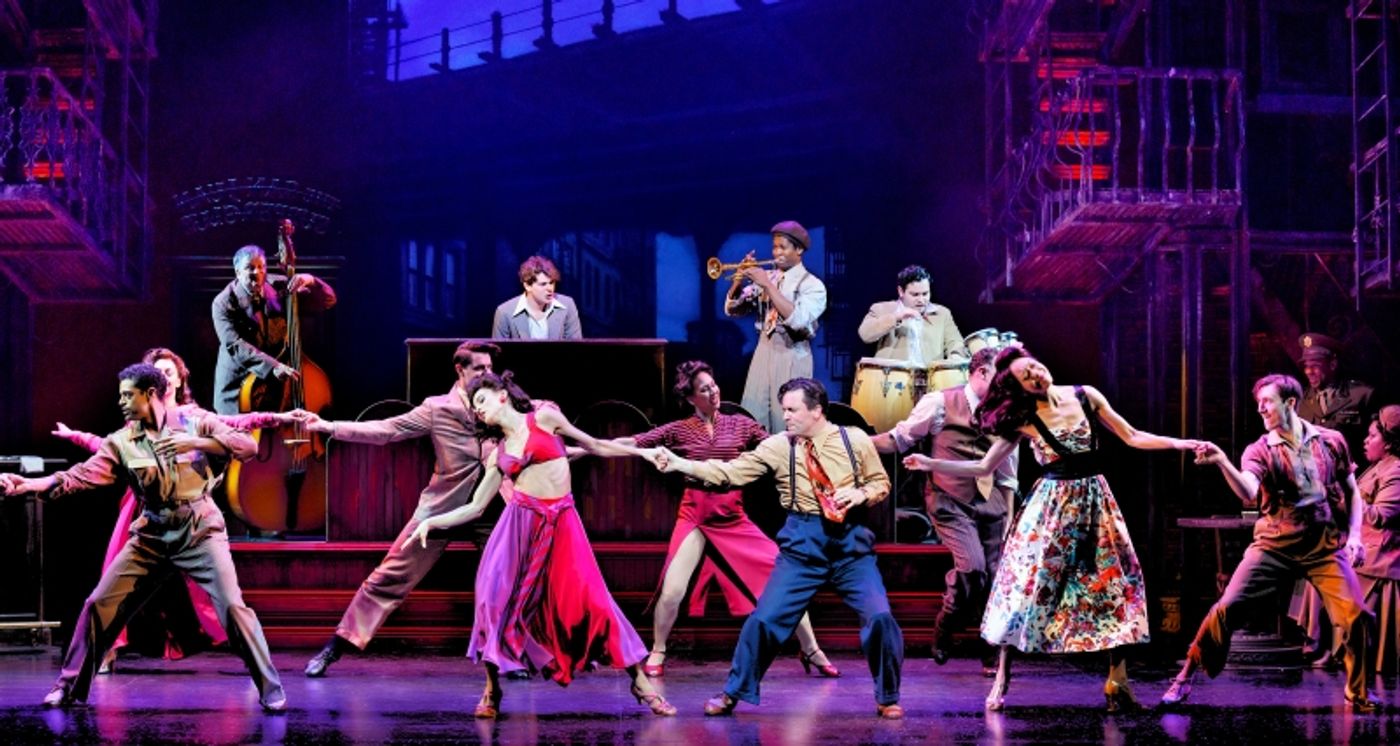Don't Bet Against Clyde Alves- How NEW YORK, NEW YORK Brought A Dance Dynamo Back To Broadway
Clyde is a veteran Broadway dancer and actor whose credits include On The Town, The Music Man, Bullets Over Broadway, Wicked and more!

The new Broadway musical, New York, New York, is a love letter to the city that never sleeps and all those who make their way to its shores to make their dreams come true. 23 years ago, Clyde Alves was one of them.
A Canadian import born to Portuguese immigrants, Clyde first made his mark on Broadway in Susan Stroman's smash 2000 revival of Meredith Willson's The Music Man, taking home an Astaire Award for his portrayal of River City ruffian, Tommy Djilas. From there, Clyde went on to accrue numerous Broadway credits including Oklahoma!, Wicked, Hairspray, Bullets Over Broadway, Nice Work If You Can Get It, Anything Goes, and the acclaimed Broadway revival of On The Town.
This season, Clyde returns to Broadway following a nine-year hiatus during which he wed and started a family with fellow dance icon, Robyn Hurder, who can currently be seen on Broadway in A Beautiful Noise.
As New York, New York's resident Italian-American, Tommy Caggiano, Clyde has returned in fine form, turning in a full-hearted, funny, and lovable sidekick to Colton Ryan's Jimmy Doyle. Exhibiting classic charm, old school verve, jaw-dropping dance ability, and a palpable sense of joy, Clyde shines in a role tailored to his impressive skill set.
As BroadwayWorld's resident Italian-American, I set out to chat with Clyde about his triumphant return to the Broadway stage, his lengthy history with director/choreographer Susan Stroman, and what it takes to bring Tommy Caggiano to life eight times a week. Check out excerpts from our conversation below!

How did you become involved in New York, New York?
Interesting question. So, my wife and I have a nine year-old boy. After he was about two or so, we started performing again. We would go perform together in regional theaters and we would take our son with us and we would hire someone to take care of him. Once he got to be school-age, we realized that we had to stay in one spot. So at that point, as a family, we decided that we would always trade off. We would take whatever the better opportunity was, or whatever opportunity seemed to make more sense at that moment for the family. One of us would stay home and one of us would go to work. Robyn started hitting it with these great opportunities, including Moulin Rouge! and then her show now, A Beautiful Noise. Then the pandemic happened, right? So, it had been a few years that I had been not in the theatre world, and I was just very happy taking care of my son, bringing him to soccer, and having a great time.
Theatre is one of my biggest loves in the world, aside from my friends and family, and I knew it would come back, but I just didn't know when, and I had passed on many things just because they just didn't seem worthwhile compared to what my job was at home. Then I get a call from Susan Stroman a couple of years ago saying that she had an idea to create a musical version of New York, New York. This character wasn't in the movie, but she described it to me. She said, "I see this character as kind of a mix between Joe Pesci and Nick Cordero." Our late, great Nick Cordero, who was a really good buddy of mine. When she described it that way, I knew exactly who that person is. So my whole point of telling you this whole story is that I was very far away from the theatre world until I got the call about this show, and I knew that when I went downstairs and told my wife about it, that she would be fully on board. That was like two Januarys ago.
Where did you start building the character Tommy Caggiano? Did you do any sort of research?
Full disclosure, I am not Italian. My parents immigrated from Portugal to Canada, I guess I can begin there. I understand what it is to be part of an immigrant family, growing up hearing all the stories from my mom and my dad, about how they were trying to include themselves in the society and what society was like towards them at that moment in time. So I get that whole thing, and a lot of the values are very similar between the Italian and the Portuguese communities with family, honor, working hard, being a standup citizen and not taking any shit from anyone, [laughs] doing what you need to do. So that's the very beginning for me. The other part of it is I've always been absolutely obsessed with Italian culture, I watched a lot of the Italian movies, I was even into a lot of the gangster movies. When I came to New York at like 19 years old, I was always going over to Jersey and I was always going down to Little Italy. A lot of my friends were from Italian families, so it was always a thing for me, I just loved it.
%20and%20cast%20-%20Photo%20by%20Paul%20Kolnik.jpg?format=auto&width=1400)
One thing I noticed about Tommy right away is that he's not a gangster. His characterization felt really authentic to the sorts of Italian people I know. Did you build out a backstory for Tommy?
Tommy is not a gangster. He he grew up in the thirties, forties, when a lot of businesses in his community were run by the mob, it was just how things were, so he's not. The cool thing about Tommy is that he really has a do-good streak in him and does not want to fall into that even though a lot of his friends and maybe even family were in that world. So he sets out to create a real, solid world for himself and he's constantly pulling one of his best friends, Jimmy Doyle, out of trouble.
He's a selfless, selfless Italian-American who puts everybody else on a higher level of importance than himself. That's sort of the kind of energy that I try to radiate in the show and, to be honest, I can draw a lot from my personal life because as much as I set out to be an actor, I've been very lucky with how my personal life has taken shape. I am a father and a husband, and so I definitely see myself very much as a family man. In the nine years since my son was born, I've learned a lot about what it means to fully give yourself over for somebody else's benefit. I'm in a place now in my career too, where I really relish any opportunity to be able to do what we're doing on stage, but I still have a lot of dreams, and I feel like that's kind of Tommy Caggiano in a nut shell.
I know you have a bit of a history with Susan Stroman. Where did your professional relationship begin? What is it like working with her?
I was 19 and working at the Stratford Festival in Ontario, Canada and my agent told me that somebody from that agency was assisting Stro in a production of The Music Man, which was a revival she did in 2000, and they hadn't cast the role of Tommy Djilas yet. He was going to send five guys over from Toronto and asked if I wanted to go. So on my day off, I fly to New York, I audition for Susan Stroman. Long story short, I get a call back, I go back the next week, and here I am in front of Stro doing this material. I go back home, and a day later I get a call. I got an offer for the role. So it was just one of those moments where, I guess preparation met opportunity, and all of a sudden I'm 19 years old and I'm cast in a Broadway show. That was my first experience with Stro.
I was obviously very intimidated working with all these New York actors and performers, but I was immediately struck by a few things. One, how prepared she was and two, the kind of joy she radiated in the room, but at the same time, the amount of professionalism and respect that she commanded from everybody in the room, but not by any way of force, just by the fact that she's so on top of her game that she sets a high bar that everybody is just sort of inherently trying to meet. The last thing was how collaborative she was, especially with this young kid from Canada. She could have very easily just told me what to do, but I was struck with how much she wanted me to be a part of the process. That experience created like a lifelong bond with, with Stro and I. We very quickly developed a shorthand for how we were going to create dance sequences.

How did that dynamic inform the creation of Tommy Caggiano?
She's hired me a few times since and all these years later, 23 years later, we're in different places in both of our lives and we're working on a brand new, original piece and creating an original role and it was the same thing. It was like no time had lapsed between us and that's basically how we created most of the role. Some directors have less room for that, and she let me and the writers just play. There were times that I would just do slight improvisations, even in the scenes, you know? And what you do is just keep the good stuff and that's what we did. That's another reason why this process, this show, this experience has been just everything that I would hope for. The lines are blurred between what's been written and what the actor has brought to the process. That's personally my favorite part of the process, and that's what Stro is all about.
You have a gorgeous and very high-energy partner dance with Gabriella Enriquez during the number, "San Juan Supper Club". I feel like doing work like that requires a huge amount of trust. How long does it take to build that trust with a new dance partner?
Well, you know, there's few knocks around along the way [laughs] an elbow here and a foot there. The beauty of it is giving each other space to find what it is and to find your language together. We come into this process with our own language, but then of course, like any relationship, it becomes its own entity. I'm really proud of the fact that Gabriella and I have done that over the period of rehearsals and previews and stuff.
How about the "Wine and Peaches" scaffold tap dance? While I am aware that you aren't on top of an actual building, it does seem a little precarious. Is it as delicate as it looks?
It's definitely precarious. It's two feet wide and we're turning and jumping and tapping and sliding. It's four feet high and it's hard steel that we're tapping on, so it's a little bit slippery. Especially when the lights are up there in your face, it's a little blinding. It's very precarious. We've been lucky so far, knock on wood, that we haven't had any major injuries. We only had a couple times that people slipped off. That's a concept that Stro brought into the room. She knew exactly what she wanted to do, she had already designed it with Beowulf [Boritt] and she described it to us. Some of the tap stuff that I do by myself, part of that was brought on from Stro and part of that was just sort of things that I came up with that she liked. So another collaborative moment, but the rest of that number with everybody doing their thing, that's one thousand percent Susan Stroman and definitely different from anything I've ever done or seen before.
You have one of the most iconic lines in the show, "Don't bet against New York." As an artist trying to make it in the worlds of dance and Broadway, I'm sure you had moments where you felt ready to call it a day. Do you have any advice for young artists grinding it out in the city?
When I read that line in script, it made the hair stand up in the back of my neck because obviously, it speaks to me as a person and as an actor here in the city, but you know, I don't know anybody who's had a life in New York, that doesn't understand what that means. Because it is not the easiest place to have a life. It moves so quickly, it can be tough, there are so many people at the top of their game that it can be competitive to try to work in any industry here. If you've been around long enough, you've had those major disappointments, and if you've been around long enough, you can see that the cycle comes back around. Just when you think you're down and out, there's this corner of the sky that opens up and the light shines through and you get this opportunity. That is such a magical moment in life and I think it happens in New York City, probably more intensely than anywhere else in the world.
The line I have before that is, "New York can break you," and I've felt broken so many times, but it can save you too, you know? I was not in this industry. I felt like nobody cared. I wasn't even auditioning. I was out and I just had to make peace with that. Then all of a sudden I get this call from one of the biggest director/choreographers to ever work in the industry saying, would you like to play this part? Nevermind audition, just come do it. You know? That's an example of how it can save you, too. If you can just weather the storm, the sun comes back out again at some point.
Clyde Alves is a 2023 Chita Rivera Award nominee for his performance in New York, New York. Clyde has been seen on Broadway in On The Town (Ozzie) for which he earned an Astaire Award nomination, Bullets Over Broadway, Nice Work If You Can Get It, Anything Goes, Wicked, Hairspray, Oklahoma!, and The Music Man (Tommy Djilas) for which he won an Astaire Award.
On television, he has been seen in Disney ABC’s The Music Man (Tommy Djilas) His Off Broadway credits include Altar Boyz (Juan) and New York City Center Encores in Hey, Look Me Over! (George M.), The New Yorkers (Monahan). His regional theatre credits include Crazy For You (Bobby Child) Drury Lane Theatre, Nice Work If You Can Get It (Jimmy Winter) Music Theatre Wichita, Oklahoma! (Will Parker) at The Muny, Kiss Me, Kate (Bill Calhoun) at The 5th Avenue Theatre & Shakespeare Theatre Company. Aside from being a proud father and husband, Clyde is a singer-songwriter who has released his debut EP “Back To Us” and brand new single “It’s Still A Party.”
Powered by
|
Videos

